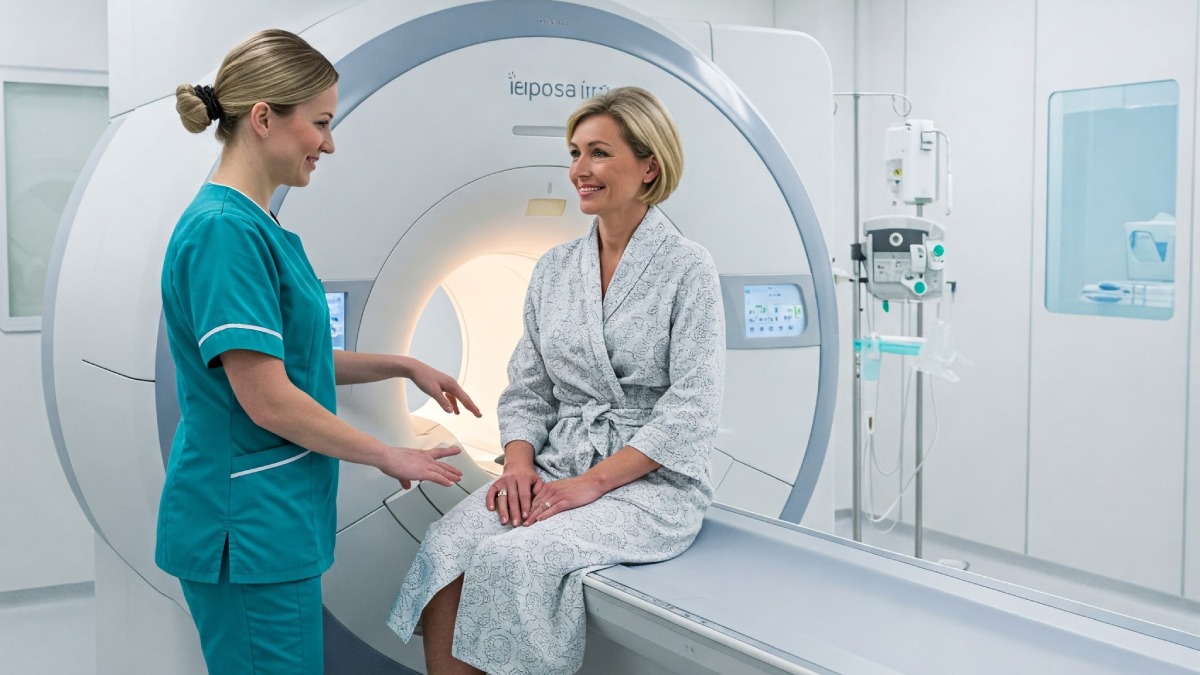Full body MRI scans are becoming more popular, especially among people looking to take control of their health, get early answers, or feel reassured about what’s happening inside their body. But are they worth it? Do you really need one included in your private health screening package? Are they overkill?
In this blog, we’ll explain what a full body MRI is, what it can (and can’t) detect, the main benefits and risks, and some alternatives that might be a better fit for you.
What Is a Full Body MRI?
A full body MRI (magnetic resonance imaging) scan is a detailed, non-invasive scan that uses powerful magnets and radio waves to take images of the inside of your body. Unlike X-rays or CT scans, one of the benefits is that a MRI doesn’t use any radiation.
It can scan most of your major organs, muscles, joints, and tissues in one session – including your brain, spine, chest, abdomen, and pelvis. In some cases, it also includes parts of your limbs.
Private providers sometimes offer full body MRIs as part of advanced health check packages, sometimes alongside blood tests and other assessments.
What Can a Full Body MRI Detect?
A full body MRI can help identify:
- Tumours, cysts, or unusual growths
- Signs of inflammation or infection
- Spinal problems like slipped discs or narrowing
- Some brain and nerve conditions
- Liver, kidney, or pancreatic issues
- Muscular or joint problems
It’s a powerful tool that can sometimes detect issues before symptoms appear, which is why it’s popular for people who want early detection.
That said, it can’t pick up everything. For example, it’s not the best scan for looking inside the lungs (a CT scan is usually better for that), and it doesn’t replace screenings like colonoscopies or mammograms.
What Are the Benefits of a Full Body MRI?
There are several reasons why people choose a full body MRI:
- No radiation – unlike CT scans or X-Rays
- Covers multiple organs and systems – all in one scan
- High-quality images – that can reveal subtle changes
- Peace of mind – especially for people with a family history of illness
- Useful for early detection – spotting problems before they become serious
- Can be used as a baseline – so you can compare future scans
A MRI might also be an option for people who have vague or unexplained symptoms that haven’t been diagnosed with other tests.
What Are the Limitations or Risks?
Even though full body MRIs sound ideal, they aren’t perfect. It’s important to know the risks, limitations and potential downsides:
- Incidental findings: These are harmless abnormalities that show up on scans but don’t cause problems. Finding them can lead to stress, extra tests, or even procedures you may not need.
- Not suitable for everyone: You can’t have an MRI if you have certain implants (like some pacemakers), and people with severe claustrophobia may struggle inside a ‘closed’ MRI machine.
- Expensive: Full body MRIs are not cheap. In the UK, they often cost between £1,000 and £2,500 depending on the provider.
- Doesn’t replace other tests: You still need age-appropriate cancer screenings, blood tests, and other health checks.
Who Might Benefit Most from a Full Body MRI?
A full body MRI isn’t for everyone. But it may be a good idea if you:
- Have a strong family history of cancer or other serious illness
- Have ongoing symptoms with no clear cause
- Are looking for a premium, all-in-one health check that is very thorough
- Struggle with health anxiety and want a one time screen for reassurance
Used wisely, it can be a helpful tool for early detection and peace of mind.
What Are the Alternatives?
You don’t always need a full body MRI to get useful answers about your health. Some good alternatives include:
- Targeted MRI or ultrasound scans: For example, brain MRI, abdominal ultrasound, or pelvic scan
- Private Health MOTs with blood tests: These check things like liver and kidney function, cholesterol, diabetes risk, and more
- Organ-specific screening: Mammograms, colonoscopies, heart scans
These can be more affordable and focused if you already know what area of your health you want to check.
Read more: What can a full body health assessment actually detect?
Conclusion
A full body MRI can be a powerful tool for early detection, reassurance, or building a picture of your health. But it’s not a magic fix, and it doesn’t suit everyone.
Think about your personal health goals, your risk factors, and your budget. And if you’re unsure, speak to a health professional about whether it’s the right choice for you.
In many cases, a full body MRI is best used alongside regular check ups and a healthy lifestyle, not instead of them.
About our Content
skreen is not a medical provider and does not diagnose or treat conditions. Our content is informational and should not replace professional medical advice.
We’re serious about being a trusted source of information and sharing only the highest quality, medically reviewed content. You can review our Content & Editorial Policy here.




